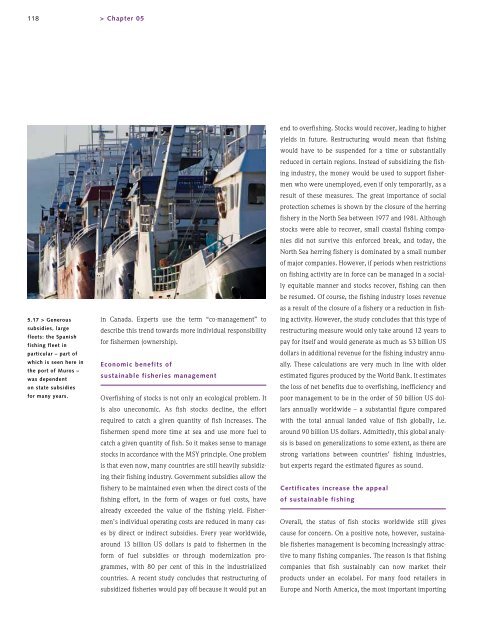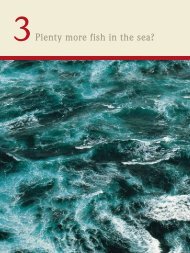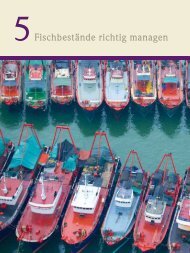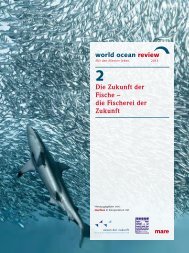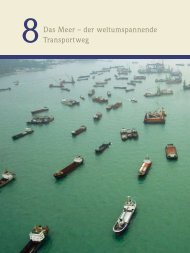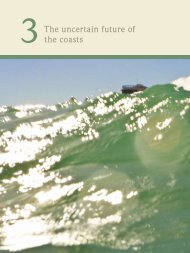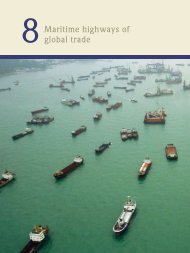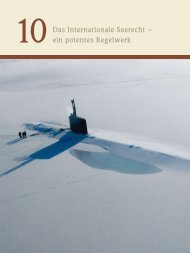Download WOR 2 PDF - World Ocean Review
Download WOR 2 PDF - World Ocean Review
Download WOR 2 PDF - World Ocean Review
Create successful ePaper yourself
Turn your PDF publications into a flip-book with our unique Google optimized e-Paper software.
118> Chapter 055.17 > Generoussubsidies, largefleets: the Spanishfishing fleet inparticular – part ofwhich is seen here inthe port of Muros –was dependenton state subsidiesfor many years.in Canada. Experts use the term “co-management” todescribe this trend towards more individual responsibilityfor fishermen (ownership).Economic benefits ofsustainable fisheries managementOverfishing of stocks is not only an ecological problem. Itis also uneconomic. As fish stocks decline, the effortrequired to catch a given quantity of fish increases. Thefishermen spend more time at sea and use more fuel tocatch a given quantity of fish. So it makes sense to managestocks in accordance with the MSY principle. One problemis that even now, many countries are still heavily subsidizingtheir fishing industry. Government subsidies allow thefishery to be maintained even when the direct costs of thefishing effort, in the form of wages or fuel costs, havealready exceeded the value of the fishing yield. Fishermen’sindividual operating costs are reduced in many casesby direct or indirect subsidies. Every year worldwide,around 13 billion US dollars is paid to fishermen in theform of fuel subsidies or through modernization programmes,with 80 per cent of this in the industrializedcountries. A recent study concludes that restructuring ofsubsidized fisheries would pay off because it would put anend to overfishing. Stocks would recover, leading to higheryields in future. Restructuring would mean that fishingwould have to be suspended for a time or substantiallyreduced in certain regions. Instead of subsidizing the fishingindustry, the money would be used to support fishermenwho were unemployed, even if only temporarily, as aresult of these measures. The great importance of socialprotection schemes is shown by the closure of the herringfishery in the North Sea between 1977 and 1981. Althoughstocks were able to recover, small coastal fishing companiesdid not survive this enforced break, and today, theNorth Sea herring fishery is dominated by a small numberof major companies. However, if periods when restrictionson fishing activity are in force can be managed in a sociallyequitable manner and stocks recover, fishing can thenbe resumed. Of course, the fishing industry loses revenueas a result of the closure of a fishery or a reduction in fishingactivity. However, the study concludes that this type ofrestructuring measure would only take around 12 years topay for itself and would generate as much as 53 billion USdollars in additional revenue for the fishing industry annually.These calculations are very much in line with olderestimated figures produced by the <strong>World</strong> Bank. It estimatesthe loss of net benefits due to overfishing, inefficiency andpoor management to be in the order of 50 billion US dollarsannually worldwide – a substantial figure comparedwith the total annual landed value of fish globally, i.e.around 90 billion US dollars. Admittedly, this global analysisis based on generalizations to some extent, as there arestrong variations between countries’ fishing industries,but experts regard the estimated figures as sound.Certificates increase the appealof sustainable fishingOverall, the status of fish stocks worldwide still givescause for concern. On a positive note, however, sustainablefisheries management is becoming increasingly attractiveto many fishing companies. The reason is that fishingcompanies that fish sustainably can now market theirproducts under an ecolabel. For many food retailers inEurope and North America, the most important importing


